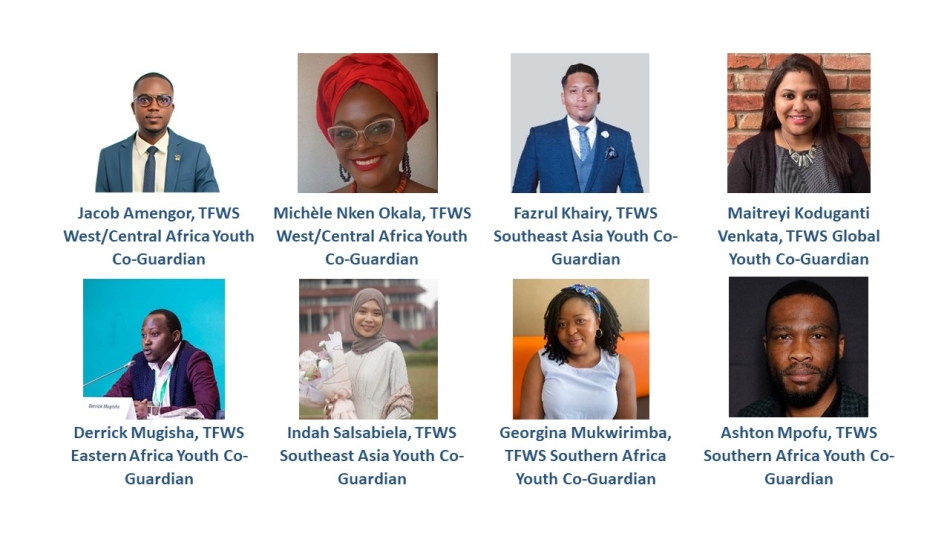The Transformative Futures for Water Security (TFWS) initiative aims to reflect the diversity of water users in the TFWS process – especially young people. It is therefore essential that young people working in water and science are ‘co-guardians’ of the initiative. We want to ensure that those with the greatest stake in future water security, and the water science needed to support it, are at the forefront of TFWS dialogues – this is also crucial for bridging the gap between policy and science. To find out how our youth co-guardians view the future of science and water policy, we asked them several important questions. Here is what they had to say:
To find out how our youth co-guardians view the future of science and water policy, we asked them several important questions. Here is what they had to say:
What are the barriers to implementing science-based water processes and policies?
Fazrul: I think, due to the diversity and complexity of environmental and social issues, it is often challenging to identify the role of water and adequately incorporate it into the management process.
Michèle: There is also the problem of collaboration between policy, and scientific research is central. Strategic water resource management plans do not fit with the realities on the ground.
Maitreyi: One of the biggest barriers, I believe, is the difference in how science is understood and interpreted by different water users – impeding the effective and efficient implementation of water processes and policies.
Derrick: In addition, we still have few women in the water sector, and gender-based challenges still hinder their participation. Without the voices of women and girls in addressing water challenges, implementation fails. Science-based decision-making on water issues should include full and effective participation of women and girls, sharing knowledge and experience, and with a safe space to engage.
What can we do to strengthen the role of science in water policy, strategy and practice?
Georgina: There is an issue of not looking at things holistically and not having a full picture of the issues. We solve problems in parts while isolating other issues, and in the end, we have unintended consequences.
Jacob: I think water science communication needs to be broken down so that all stakeholders can understand it.
Indah: Science is broad and flexible. I believe it’s time to do more research on how we can facilitate the participation of marginalized groups, bring up their voices, and start integrating and bridging local knowledge with science.
What can we do to make water science more accessible?
Ashton: Firstly, science is not finished until it is effectively communicated, accessed and understood by users who can exploit it to improve livelihoods.
Georgina: I think if it’s important to make water science more accessible to very diverse groups of knowledge users, then we need to make an effort to involve them from the beginning in the creation of knowledge – this could even improve knowledge uptake through ownership.
Indah: By learning and understanding each other, we can begin listening and creating awareness of the importance of water, along with the consequences and the impacts of our actions.
Maitreyi: It’s also a good idea to use different dissemination techniques like art, theater and music, which allow diverse knowledge users to connect to science while also establishing sustainable communication flows!
Why are the TFWS dialogues important in the lead-up to the United Nations (UN) 2023 Water Conference?
Derrick: The TFWS dialogues are important to get all stakeholders involved in shaping the UN Water Conference, to get everyone on the same page about what works and to let go of what does not.
Ashton: The TFWS initiative is important because it allows inclusiveness and gives voices to a diverse group of stakeholders.
Michèle: These dialogues bring all the water stakeholders to the same table, allowing proposals that consider each other’s sensitivities. This dialogue makes it possible to move toward a consensus that will facilitate the implementation of the roadmap resulting from the UN Water Conference.
Why is it essential that young people are included in this conversation?
Maitreyi: Decisions and policies made today will directly impact the lives of young people because they inherit the future from the current generation. Engaging them in this conversation will ensure that their voices are respected, heard and included in the decisions that define their future.
Jacob: Combining the youths’ enthusiasm and digital skills with the rich experience of the seniors leads to sustainable policies, strategies and implementation, which is vital moving forward into the second term of the Water Action Decade.
Fazrul: Young people will inherit the consequences of decisions made today. I have confidence that our voices will be heard at the highest level and help implement innovative solutions to influence change.
Find out more about TFWS on social media by following #TFWSDialogues and use this toolkit to join the conversation.

